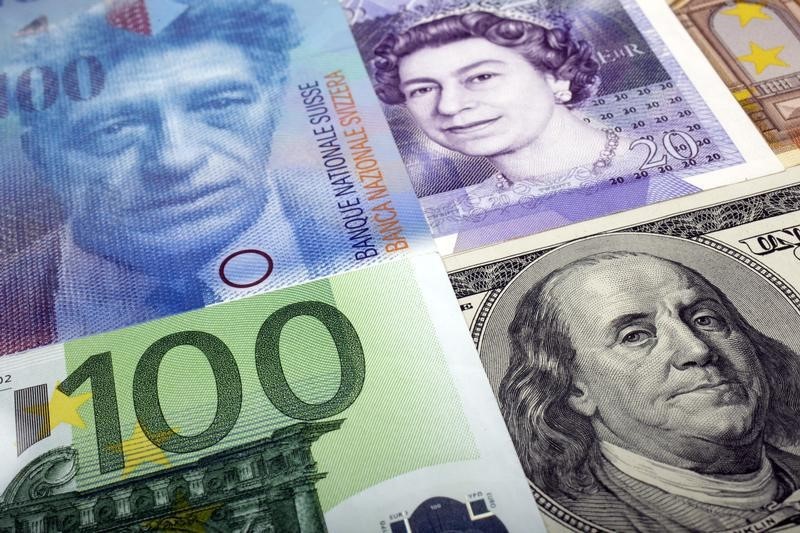© Reuters.
Investing.com – Coinciding with major central banks announcing emergency support for the currency, along with governments announcing support for currency markets after an outspoken IMF criticism last week on the strength of the dollar.
The Japanese government has announced its intention to intervene directly in support of the yen, which has fallen to its lowest level in 32 years, making purchases that could take place without revealing it at the moment, according to the finance minister.
Side by side the UK government announced the rollback of all announced tax cuts in the mini-budget, which sent the markets into a violent dip as the pound plunged to the bottom of the past 38 years.
gold
The US dollar rose in the $ 15 range Monday to 1658 levels, up 0.9% from 0.4% in early trading.
And futures on the yellow metal rose during trading today, Monday, in the range of 1%, or 16, to levels of $ 1665 an ounce.
dollar
It fell slightly to 112.7-point levels before cutting its losses to 112.9-point levels against a basket of major currencies during these trading times on Monday.
The euro rose in these times of Monday’s trading by 0.2% to 0.973 levels and the euro holds the largest relative weight in the leading dollar index with 56%.
Although there is no agreement indicating such a rate hike in future meetings, policymakers have already expressed their willingness to raise the interest rate by another 75 basis points to 0.75% at the deposit rate in the year. meeting scheduled for the end of this month.
The euro is still below par with the US dollar even after the minutes of the last meeting of the European Central Bank indicated that tighter monetary policies will be applied in the future and the euro ended the trading week at 0 , 9745.
The pound jumped more than 1% to $ 1,129 after news of the government’s withdrawal from the decisions that drove markets down.
After severe market turmoil and mounting criticism from Britain and around the world, the UK government canceled its plan to eliminate the over £ 150,000 ($ 166,770) income tax cut from 45% to 40%.
The British pound has recently seen a flurry of fluctuations and is falling despite a sharp rise in bond yields, usually a sign that markets are concerned about policy credibility.
yen
At these times Monday’s trading rose 0.1% to levels of 148.8 yen per dollar.
Japanese authorities continued their warnings to the market on Monday to respond firmly to the rapid falls in the Japanese yen, following the collapse at the end of last week to a 32-year low and meetings of global financial leaders who recognized the currency’s volatility.
“Each country will respond appropriately” on currencies, said Masato Kanda, Japan’s head of currency diplomacy, following last week’s G7 statement that members would closely monitor recent fluctuations.
But the statement by Masato Kanda, Japan’s head of currency diplomacy, stopped there, without giving any indication of a joint intervention.
The Japanese yen closed the week’s trading above the red line at 145, reaching 145.33, and Japanese Finance Minister Shunichi Suzuki said the government is ready to intervene in the currency markets to avoid deeper losses for the local currency. .
The Australian dollar has risen in these moments since trading on Monday, within the 0.7% range, to reach levels of 0.624.
The Reserve Bank of Australia’s decision to slow the pace of policy tightening, along with other macroeconomic factors that supported the US dollar, impacted the Australian dollar, which ended the week at 0.6368.
The Reserve Bank of Australia launched a dovish surprise by raising the benchmark interest rate by just 25 basis points, ending a series of massive 50 basis point hikes.
The Reserve Bank of Australia has raised interest rates by 2.25 percentage points since May this year, keeping the cash rate at an all-time low of 0.1%.
Lowe said the board expects interest rates to rise further in the coming period as we closely monitor the global economy, consumer spending, and wage and pricing behavior.
monetary Fund
At a meeting in Washington on Wednesday, the financial leaders of the Group of Seven Industrialized Nations, which includes the United States, Japan and Great Britain, acknowledged “rising volatility” in many currencies and the need to monitor markets.
US Treasury Secretary Janet Yellen said in a press conference after the International Monetary Fund and World Bank meetings in Washington that the United States is “happy” with the repercussions of the monetary tightening from advanced economies to the rest of the world.
But he also said that the dollar’s appreciation against many other currencies “largely reflects differences” in economic shocks countries face and differences in economic policies.
“So my position would be that market-determined exchange rates are the best dollar system we support,” Yellen said, referring to US tolerance of dollar appreciation.
exonerate Biden
“The problem is the lack of economic growth and reasonable policies in other countries, not in the United States,” said US President Joe Biden.
Biden added the issue of “global inflation”, which is getting worse in other countries than in the United States. Biden stressed: “Our economy is very strong.”
On the other hand, the International Monetary Fund said in its latest report that the sharp rise in the value of the US dollar this year and its rise to a record high since 2000 has led to significant economic consequences in almost every country in the world. .


